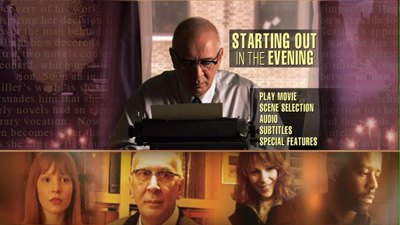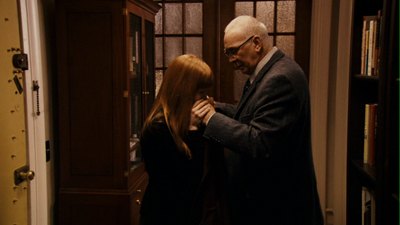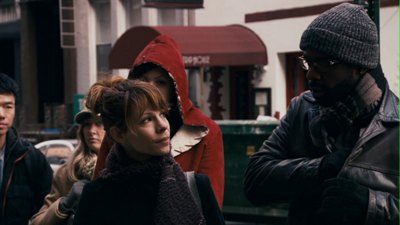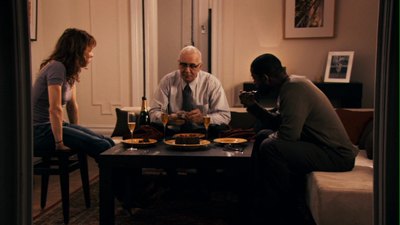| Reviews & Columns |
|
Reviews DVD TV on DVD Blu-ray 4K UHD International DVDs In Theaters Reviews by Studio Video Games Features Collector Series DVDs Easter Egg Database Interviews DVD Talk Radio Feature Articles Columns Anime Talk DVD Savant Horror DVDs The M.O.D. Squad Art House HD Talk Silent DVD
|
DVD Talk Forum |
|
|
| Resources |
|
DVD Price Search Customer Service #'s RCE Info Links |
|
Columns
|
|
|
Starting Out in the Evening
THE MOVIE:

The most basic instruction ever given to writers is to figure out what their characters want and then go about helping them achieve it. All of the characters in Starting Out in the Evening don't just have specific desires, but how we want things and what it means in regards to what those around us want is also one of the film's major themes.
Leonard Schiller (Frank Langella) is a writing professor and the author of some four novels, all of which are out of print and more than a decade behind him. He has been struggling with his fifth book for ten years. He describes his process as following his characters around and recording when they do something interesting. Whatever that interesting thing may be for this current set has yet to materialize, and Leonard feels like he is running out of time. Age is starting to get the better of him.
Enter Heather Wolfe (Lauren Ambrose), a graduate student who has decided to make Leonard Schiller her cause. She intends to write her dissertation on his fiction, with a particular focus on his first two books. They touched her very deeply, and she believes Leonard is a great liberator of his creations, giving them the freedom to be and to act. He sees himself more as their jailor, the proud poppa who never taught his kids how to keep their hands out of the fire. The loss of his beloved wife in a car crash between Novel #2 and Novel #3 caused a major shift in the author's work and his life. Leonard sees it as striving for something more important in his material, Heather sees it as a frightened individual cutting himself off from the rest of the human race.
Heather wants notoriety, to bask in the fame of literary greatness, and she thinks her goal is perfectly in line with her hero's, that he will relish her rescuing him from obscurity. It would be wrong to assume that Leonard doesn't want this, too, but what he desires more is to be important to one woman the way he remembers being important to his wife. The connection with Heather stirs up old feelings, and even though it's not always easy, he likes the relationship that ignites. It's not just physical, it's the comfort of having a warm body nearby. Frank Langella displays an uncommon fragility as Leonard. Though the man is a lumbering Golem when it comes to height and girth, when you get past his size and bluster, his shell is brittle and just a slight tap away from crumbling. He puts his trust in Heather, even though his instincts should tell him that her ambition and youth could betray it.

It's becoming increasingly hard to tell if Lauren Ambrose is typecast as the insecure and overcompensating young woman because she is remarkably good in such roles or if it's because that's really all she has. Heather is not much different than Claire on Six Feet Under, who is really only her recent character in the failed Parker Posey sitcom The Return of Jezebel James a couple of years younger. Heather is somewhere in the middle, but still petulant, headstrong, and annoying. There is a scene in Starting Out in the Evening where Heather gets slapped, and though she protests that she didn't deserve it, chances are you'll think she did. It's something about her demeanor, like she knows she doesn't belong and is going to pretend she does anyway. Is that all for the character, or is it an immature actor dressing up in big people's clothes?
Running in conjunction with the Heather/Leonard relationship is a rekindled romance between Leonard's 40-ish daughter Ariel (Lili Taylor) and her political activist boyfriend Casey (Adrian Lester). The two split several years before due to their conflicting opinions on having children. Again, it's down to wants: she wanted kids, he didn't. Casey's return to New York corresponds with Heather's entrance into the Schiller family dynamic, turning the father/daughter duo into a sort of triangle. This makes getting back with Casey a kind of minor rebellion against Dad, especially since it means dropping a lawyer boyfriend (Michael Cumpsty) of whom Leonard approved. Leonard warns that the same old wants will be a problem in the second go-around, too, and sure enough, people don't change.
Andrew Wagner, working with writer Fred Parnes to adapt the novel by Brian Morton, listened to Leonard's storytelling advice when it came to directing Starting Out in the Evening: he sets his characters on their path and then watches them go. He doesn't force the drama toward any destination, but instead lets the personal interaction take its course. For such a dialogue-heavy, literary picture, Wagner lets the actors use body language and gesture to convey an awful lot. It's another very basic piece of writing advice, to show and not tell. There are several scenes where the most impact comes from how a character moves or from where he or she decides to put his or her hand.
Kudos to Wagner, as well, for actually showing what it is really like to be an author. The writing life is not an exciting one. It is not full of brave acts of derring-do. It is a lot of tedium, a lot of sitting alone in a chair and nudging words around until they assemble in the right order. Leonard's inability to write is not romanticized as yet another inane glorification of "writer's block." I'll tell you now, in real life, the blank page is not scary nor does it stay blank for long, and any writer who tells you different is just saying that to sound cool rather than lazy. It makes more sense that Leonard fills each sheet of paper with material that just isn't very good. He is a man who has lost his way in his personal life, and so he has become lost in his creative one, too. It's a quiet disease, and only a quiet story like Starting Out in the Evening can convey it accurately. (So, too, is growing old a quiet condition, but one that is no less crippling for an independent mind like Leonard's. This makes up a whole other great aspect of this film that I haven't even touched on.)
When Heather accuses Leonard of taking his characters away from the world because of his own emotional cowardice, he responds that the reality is that they learned the consequences of living life only for themselves. It's really the lesson that all of the characters in the movie must learn. They can keep wanting what they want without ever making room for their loved ones, or they can come to understand that compromise is not a moral failure, that to be happy they must be inclusive. Perhaps that's the theme in Leonard's books that Heather should have zeroed in on, that freedom does not come without its price, and sometimes the greatest freedom is letting go of our own shackling desires in service of the people around us.

THE DVD
Video:
Shot in HD, Starting Out in the Evening comes to DVD at a 16X9, 1.78:1 aspect ratio (slightly off from the reported 1.85:1 theatrical ratio). As with most high-def features, the film makes a rather smooth transition to the home arena, its colors and detail coming through as clear and strong as the filmmakers intended. I noticed very minor resolution problems in a couple of scenes, most notably in the bookstore in the first twenty minutes of the movie, but this was a rare instance and not of much concern.
Sound:
There are two Dolby audio options here, a 5.1 mix and a 2.0 stereo mix. Starting Out in the Evening is not a complicated picture from a sound standpoint, it's largely indoors and full of talking. Even so, the mixes have a sharp clarity that means that oh-so-important talking rings through loud and clear.
Spanish and English subtitles, as well as English Closed Captioning, are also provided.
Extras:
The big extra here is the audio commentary with director Andrew Wagner. Wagner is clearly a good speaker and enthusiastic about the work, but the commentary runs a bit dull. His main technique is to summarize what is happening on screen, offering fairly obvious insight into motivation. At times, he breaks from this to explain his choices and the composition of a shot, and this proves he is a considerate, thoughtful director. We needed more of that and less of the explication.
The only other extras are a TV commercial and theatrical trailer for Starting Out in the Evening. Trailers for several other films also play as the DVD loads.
FINAL THOUGHTS:
Starting Out in the Evening is one of those rare glimpses into a creative life that understands that creation itself is not flashy, and that it's the relationships that swirl around an author that makes the man that sits down to type out his manuscript. As the aging writer Leonard Schiller, Frank Langella is amazing, portraying all of the pomp of a man of intellect who has gathered a lifetime of experience along with the shattering despair that comes when the experience no longer serves him. Seeing another chance at leaving some kind of mark thanks to an opportunistic grad student, Leonard's personal travails run in tandem with his daughter's own romantic problems. Director Andrew Wagner tells a quiet story, and he's content on letting it be quiet. Starting Out in the Evening is about the people, nothing more. Their hopes and desires, their successes and failures. Recommended.

Jamie S. Rich is a novelist and comic book writer. He is best known for his collaborations with Joelle Jones, including the hardboiled crime comic book You Have Killed Me, the challenging romance 12 Reasons Why I Love Her, and the 2007 prose novel Have You Seen the Horizon Lately?, for which Jones did the cover. All three were published by Oni Press. His most recent projects include the futuristic romance A Boy and a Girl with Natalie Nourigat; Archer Coe and the Thousand Natural Shocks, a loopy crime tale drawn by Dan Christensen; and the horror miniseries Madame Frankenstein, a collaboration with Megan Levens. Follow Rich's blog at Confessions123.com.
|
| Popular Reviews |
| Sponsored Links |
|
|
| Sponsored Links |
|
|
| Release List | Reviews | Shop | Newsletter | Forum | DVD Giveaways | Blu-Ray | Advertise |
|
Copyright 2024 DVDTalk.com All Rights Reserved. Legal Info, Privacy Policy, Terms of Use,
Manage Preferences,
Your Privacy Choices | |||||||












